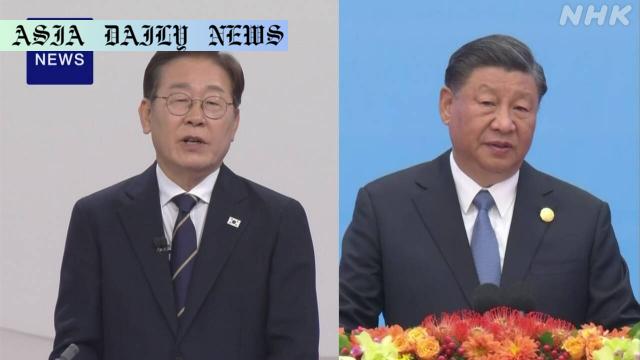APEC Summit, South Korea’s Lee Jae-myung and China’s Xi Jinping engage in crucial dialogue for successful summit collaboration.
South Korean President Lee Jae-myung and Chinese President Xi Jinping discussed APEC Summit collaboration.
Xi Jinping congratulated Lee on his election and was invited to visit South Korea for the summit.
China and South Korea emphasized maintaining multilateralism, free trade, and stable supply chains.

Introduction to the APEC Summit
The recent phone conversation between South Korea’s President Lee Jae-myung and China’s President Xi Jinping underscored the importance of strengthening bilateral relationships for the upcoming Asia-Pacific Economic Cooperation (APEC) Summit. Scheduled to be held in South Korea later this year, the summit promises to bring together regional leaders to discuss shared economic interests, multilateralism, and challenges pertaining to the global supply chain, free trade, and regional stability.In a conversation lasting approximately 30 minutes, the two leaders reaffirmed their commitment to ensuring the success of the APEC Summit, with President Lee extending a formal invitation to President Xi. Should Xi accept, this would mark his first visit to South Korea in 11 years, a notable milestone in improving China-South Korea relations. These discussions also carried significant implications as they reflected the evolving dynamics among South Korea, China, and major global powers such as the United States and Japan.
Deepening Bilateral Ties
President Xi congratulated Lee Jae-myung on his recent election, expressing optimism for fostering closer ties. President Lee took this opportunity to highlight key regional concerns, notably peace and stability on the Korean Peninsula and the need for denuclearization. Lee requested China’s active role in playing a constructive part in these efforts, emphasizing the mutual benefits of stability in the region. Correspondingly, Xi Jinping assured South Korea of China’s readiness to work collaboratively to address these pressing issues, reinforcing both nations’ shared goals of regional peace.The dialogue also showcased China’s interests in securing robust multilateral channels in the face of its trade friction with the USA. Xi emphasized the need for South Korea and China to take a united stance in safeguarding global economic structures, ensuring the maintenance of stable and secure economic and trade frameworks in the region. This discussion comes at a time of increasing geopolitical complexities and highlights the cool-headed diplomatic moves made by South Korea on the world stage.
Regional Cooperation and Globalization
South Korea’s aspirations for regional integration extend beyond China. Merely a day prior, President Lee had engaged with Japanese Prime Minister Ishiba Shigeru through a phone conversation. This strategic alignment between South Korea, Japan, and the US signals Seoul’s commitment to broader trilateral cooperation, which stands as an important counterbalancing factor amidst increasing competition among world powers. By connecting with neighboring Beijing and Tokyo almost in tandem, South Korea presents itself as a key diplomatic player in ensuring a smooth transition in global politics within the Asia-Pacific region.In a period of rising nationalism and economic reshuffling, discussions on the importance of multilateralism and globalization have taken a front seat. President Xi aligned with South Korea’s commitment to pursuing collaborative, open-market approaches and invited mutual focus on enhancing regional supply chains. Given China’s economic muscle and South Korea’s advanced technology industries, enhanced collaboration could serve as a bellwether for building smarter regional trade routes and policies conducive to innovation and growth.



Commentary
Reflections on Diplomatic Collaboration
The deepening ties and clear signal of cooperation between South Korea and China come as an encouraging breakthrough in a time of mounting regional complexities. President Lee Jae-myung’s phone conversation with President Xi Jinping underscores his strong commitment to fostering bilateral and multilateral alliances while seeking shared solutions for issues that are of vital economic, environmental, and political significance in the region. Such initiatives showcase South Korea’s rising diplomatic prowess under a leadership determined to balance competing global influences.While these gestures are preliminarily promising, the broader implications extend well into the realm of regional and global stability. For China, this offers a renewed opportunity to steady ties with a significant partner within the Asia-Pacific framework — a move that could help mitigate its growing tensions with the US and ensure active engagement in vital international summits like APEC. On the other hand, South Korea finds itself strategically poised to act as a bridge between rivaling global powers, ensuring mutual dialogue remains not only consistent but collaborative.
The Wider Impacts of APEC Collaboration
At the heart of the South Korea-China dialogue lies a drive to strengthen global trade infrastructure, reduce geopolitical risks, and tackle urgent challenges like denuclearization on the Korean Peninsula. Both sides stand to gain significantly from a thriving Asia-Pacific cooperation model, and their commitments reflect growing recognition of interdependencies in addressing these issues comprehensively.Overall, the ongoing preparations and bilateral outreach for the upcoming summit represent a multi-dimensional approach coordinated by South Korea under President Lee’s administration — one that emphasizes dialogue, collaboration, and shared prosperity in an increasingly polarized political environment. As these engagements unfold, they set a commendable precedent for how diplomacy should work amidst the challenges of a fast-evolving global landscape.